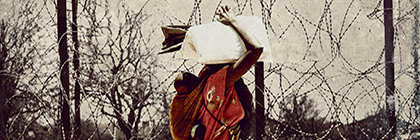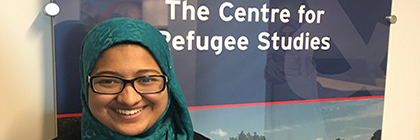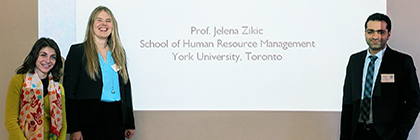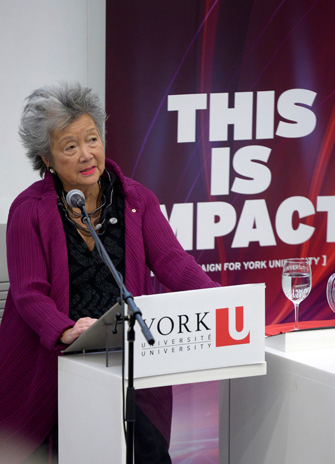For more than 500 years, Irish men, women, and children have crossed the Atlantic Ocean to reach Canada. Yet, never during that time had people arrived in such great distress as those immigrants and refugees fleeing the Great Irish Potato Famine in 1847.
A two-day symposium held at York University examined the famine period (1845 to 1851), when a million or more Irish died and another million emigrated during the worst demographic catastrophe in 19th-century Europe.

Titled “The Famine Irish and Forced Migration: An Early Canadian Refugee Crisis,” the symposium was held at the Archives of Ontario on York University’s Keele campus, and other locations, on May 22 and 23. Organized by geography Professor William Jenkins, the symposium featured speakers from the academic, heritage and arts sectors in Canada, Ireland, and U.S. who are active in the production, curating, and promotion of knowledge about the Irish Famine.
“Issues concerning immigrants and refugees have been an almost ever-present feature of public life, public debate, and public policy in Canada, particularly so in the last two centuries and increasingly in urban areas,” said Jenkins, who noted he grew up in Clondalkin, a western suburb of Dublin, Ireland.
“Those of us resident in Toronto and its region in recent times can think of not only Syrians but also Sri Lankans, Somalians, and Vietnamese, to name just four groups, who arrived in Canada with unenviable combinations of straitened circumstances and searing memories of conflict, displacement and loss. A long time before, of course, it was Irish immigrants who made a dramatic impression on society and economy in Canada during the era of famine in Ireland and the symposium focuses on this particular wave of migration to North America that materialized in the late 1840s, and in 1847 especially.”

Speakers considered the immediate and long-term impact of the arrival of Famine Irish forced migrants in the united Province of Canada, the experiences and perceptions of their Canadian caregivers, and their patterns of integration and resettlement in rural and urban communities. They also considered how new scholarship about the famine is being brought into the public domain through museums, memorials, and online public history initiatives on both sides of the Atlantic Ocean. The panel of speakers included current and recent graduates of the history graduate program at York.
Two keynote speakers were featured at the symposium: Professor Mark McGowan from the University of Toronto; and Booker Prize-nominated author Michael Collins.
McGowan discussed his attempts to document the lives of hundreds of Irish orphans who were left stranded at Quebec City in 1847. Many were adopted by French Canadian families and by Irish migrants who had already settled in Canada.
Collins ran a marathon-a-day along the Saint Lawrence Seaway from June 10 to July 10, 2016, retracing the 1847 passage of 100,000 Irish immigrants, who, upon processing at Grosse Île quarantine station, traveled onward to Toronto. He presented his thoughts on this unique experience.
In addition to conference sessions, the symposium also featured a documentary screening and the performance of a one-woman play. On the evening of May 22, the Great Famine Voices Roadshow open access oral history workshop took place at St. Michael’s College, University of Toronto. In the late afternoon and evening of May 23, there was a field trip to the Irish Famine memorial at Ireland Park on the Toronto waterfront, which followed with a closing reception at Biagio Ristorante downtown.

“This symposium covered not only Irish famine history, but also Irish famine memory, and it sought to take stock of the fact that in the years since the sesquicentennial of the famine in 1995, technological developments have changed the way we do research while, at the same time, new research questions prompt the exploration of new historical sources to assess their potential,” said Jenkins.
The symposium was sponsored by a number of York-based sources: the Division of Vice-President Academic & Provost; the Office of the Vice-President, Research & Innovation; the Faculty of Liberal Arts & Professional Studies; the Robarts Centre for Canadian Studies; the Centre for Refugee Studies; the Avie Bennett Historica Chair in Canadian History; and the City Institute. It has also received sponsorship from the Irish Heritage Trust, the Irish National Famine Museum, and the Virtual Museum of Canada.
For a full line-up of the two-day event, visit the website.














 The schedule for the two-day event includes:
The schedule for the two-day event includes:
 Over 60 million people worldwide are identified as refugees: displaced and without shelter, adequate nourishment, health care, or an opportunity to cultivate a sustaining livelihood. The feature-length documentary Warehoused, by filmmakers Vincent Vittorio and Asher Emmanuel, gives an intimate look at the plight long-term refugees face worldwide.
Over 60 million people worldwide are identified as refugees: displaced and without shelter, adequate nourishment, health care, or an opportunity to cultivate a sustaining livelihood. The feature-length documentary Warehoused, by filmmakers Vincent Vittorio and Asher Emmanuel, gives an intimate look at the plight long-term refugees face worldwide.











